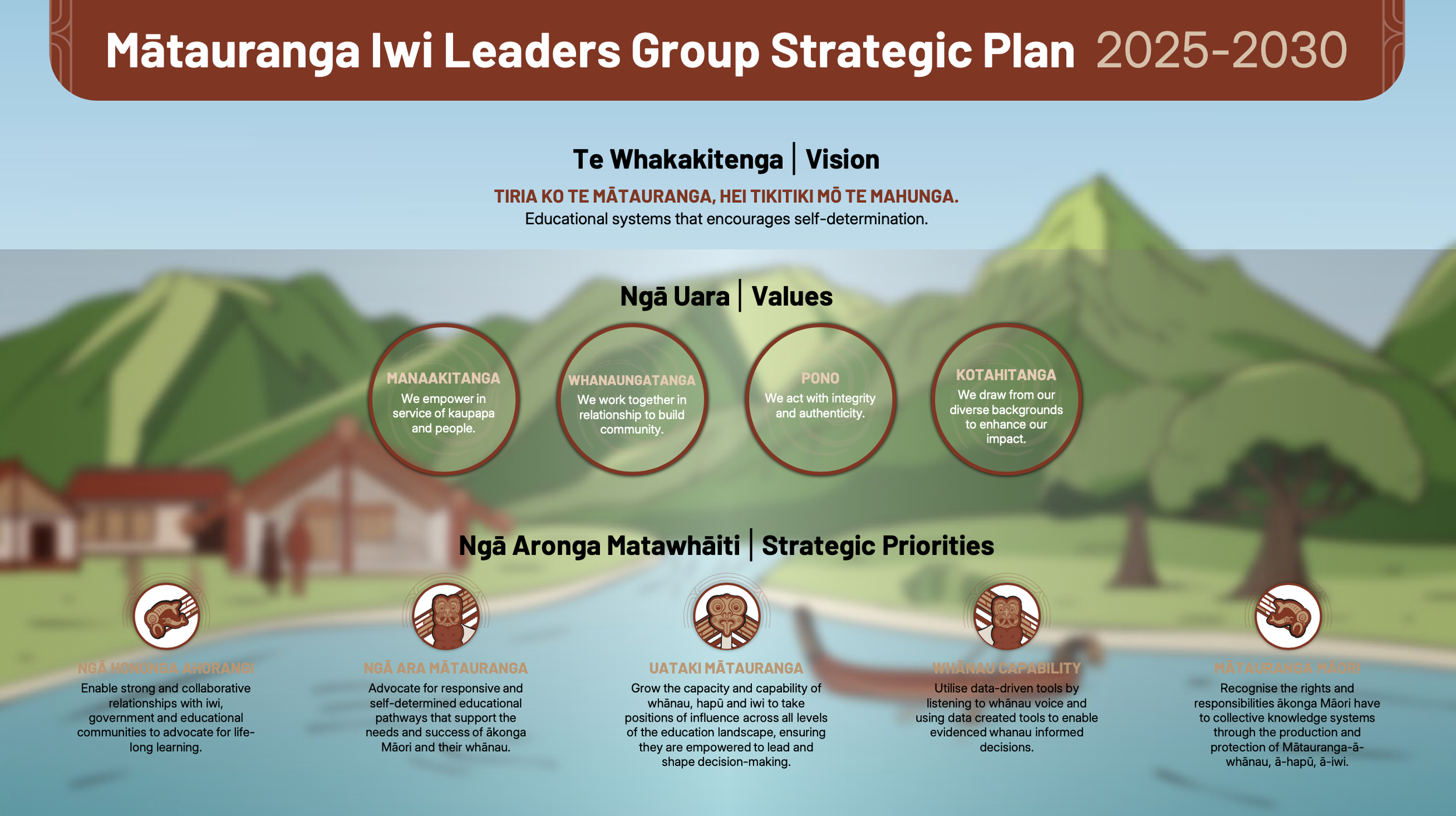
MILG Extended Report
National Iwi Chairs Forum | Te Tairāwhiti | 3-4 July 2025
KAUPAPA Mātauranga Iwi Leaders Group, July 2025
LEAD CHAIR Olivia Hall (Ngāti Rārua)
AUTHOR MILG Lead Technician: Maxine Graham, MILG Technicians
PRESENTER MILG
RECOMMENDATIONS
It is recommended that the National Iwi Chairs Forum:
Receive MILG NICF July 2025 Report
Note that this is the extended MILG report for NICF July 2025
Note the refreshed priorities under 1.4.1. Shared Work Programme with MoE
Support MILG by promoting events in this report through iwi networks
Endorse MILG political strategy to continue lobbying and advocacy positions for the educational outcomes for whānau Māori
1.0. Ngā Hononga Ahorangi
Enable strong and collaborative relationships with iwi, hapū, government and educational communities to advocate for life-long learning
1.1. He Kaupapa Kōrero
In May, MILG launched an engagement series, ‘He Kaupapa Kōrero’ - a platform to engage with our audiences on specific education kaupapa each month. These kōrero bring together iwi and Māori education practitioners, and relevant Crown agencies to engage on shared priorities, to socialise mahi and insights, and provide opportunities to work together more collaboratively on better outcomes for whānau Māori.
He Kaupapa Kōrero series:
12th May - Tertiary Education Strategy with Tertiary Education Commission (TEC)
9th June - Attendance with Ministry of Education (MoE)
14th July - Whakapapa Decisions with NZ School Boards Association (NZSBA)
11th August - MoE Procurement opportunities for iwi (to be confirmed)
8th September - Ūangarau: Mapping the education landscape
6th October - He Puna Mātauranga
1.2. Six-monthly Iwi Chairs Hui
MILG will begin hosting six-monthly hui with iwi chairs who are interested in engaging with MILG mahi or collaborating with MILG on their iwi education priorities. MILG welcomes any iwi that are interested in engaging in these sessions. To RSVP, please contact us.
1.3. MILG Political Strategy
MILG have engaged Awhi Group to help support and oversee MILG ‘s political engagement strategy as we advocate for whānau Māori in a diverse political environment. This coming quarter will focus on opposition Ministerial engagement.
1.4. Te Tāhuhu o te Mātauranga (MoE)
MILG continues to deliver on the outcomes of the Mana Ōrite Agreement. This quarter, MILG and the Ministry of Education met to reset and refresh the priorities in the shared work programme, ensuring alignment with Pou Tangata: Te Ora o te Whānau overall priorities and a continued focus on strengthening whānau engagement in education. A standing priority is to further embed and socialise the Mana Ōrite Agreement across all levels of the Ministry and the wider education system.
The April wānanga was an opportunity to reflect on the Mana Ōrite journey, strengthen shared understanding, and recommit to maintaining the intent and practice of the agreement. Both parties reaffirmed their commitment to a relationship that supports whānau, hapū, and iwi aspirations in education and reinforces accountability.
The first half of the wānanga focused on reviewing the strategic intent of the partnership. This included a review of how the Mana Ōrite Agreement has been applied, how engagement is functioning, and what is required to strengthen delivery. The kōrero reinforced the need for clearer, more consistent processes and for measures of success that reflect iwi aspirations, whānau outcomes, and the strength of the relationship, not only system metrics.
The second half of the wānanga focused on the work programme alongside key Ministry business groups, including Data and Insights, Curriculum, NCEA and Assessment, Māori Education, Attendance and Ka Ora Ka Ako (School Lunches), Communications, and Policy and Workforce. Discussions focused on resetting priorities, addressing data-sharing barriers, and ensuring iwi-led approaches are embedded across key areas like attendance, curriculum, assessment reforms, and the Māori Education Action Plan. Communications and the application of Mana Ōrite within the Education Workforce Programme were also identified as areas for further focus.
The refreshed work programme’s overarching priority is the socialisation of the Mana Ōrite Agreement, ensuring it is understood, applied, and embedded in practice. Three key priorities will guide the next phase of delivery: Attendance, focused on iwi-informed decisions to improve engagement and achievement; Whanaketanga Whānau, strengthening the use of data and whānau voice to drive evidence-based, whānau-led decision-making, including access to procurement and system levers; and Data and Insights, ensuring better access to and use of data to support iwi-led solutions, accountability, and improved outcomes for Māori learners.
The wānanga closed with confirmation of these priorities and a shared commitment to strengthen the partnership through clearer accountability, stronger data use, and an enduring focus on ensuring the Mana Ōrite Agreement remains a living, active commitment that delivers for whānau, hapū, and iwi.
1.4.1. Shared Work Programme
Overarching Priority: Socialisation of the Mana Ōrite agreement to strengthen understanding and action towards joint commitments and shared work programme.
Priority 1: Attendance: Appropriate and informed support, collaboration and decision-making to increase attendance, engagement, and achievement in education.
Priority 2: Whanaketanga Whānau: Utilise data-driven tools by listening to whānau voice and using data created tools to enable evidenced whānau informed decisions.
Supporting whānau, hapu, iwi accessing procurement opportunities
Exploring levers of change
TEC secondment
Priority 3: Data and Insights: Greater use of data and insights to increase evidence-based engagement and achievement in education.
2.0. Uataki Mātauranga
Grow the capacity and capability of whānau, hapū and iwi to take positions of influence across all levels of the education landscape, ensuring they are empowered to lead and shape decision-making.
2.1. WHAKAPAPA DECISIONS SCHOOL BOARD CAMPAIGN
This campaign is designed to increase Māori nominations for school board positions AND to increase Māori voter participation in the election process. Identified as a priority area for MILG, education governance awareness, engagement and information are all key components of the campaign which has entered into its production & promotion phase, with the official launch at the Forum.
Nominations open at the end July and close mid August 2025. The voting period will open one week after nominations ends before closing in mid-September 2025* (*schools choose when to hold their elections within a date range). MILG will be hosting a dedicated ‘He Kaupapa Kōrero’ engagement session on 14th July 3-5pm online to share more details about the broader kaupapa, with support from NZSBA. RSVP here and for more resources or to keep updated with the campaign, click here.
3.0. WHANAKETANGA WHĀNAU
Utilise data-driven tools by listening to whānau voice and using data created tools to enable evidenced whānau informed decisions
3.1. Iwi Education Strategy Analysis
MILG continues to undertake an Iwi Education Strategy Analysis to gather regional insights of iwi-led education initiatives. Engaging with iwi-led education initiatives ensures that their priorities are integrated into our work programme, enabling MILG to continue to support initiatives that benefit ākonga Māori and whānau.
This quarter, MILG reviewed the publicly available education strategies for iwi in Te Tau Ihu o Te Waka. The purpose of these overviews is to build a detailed picture of the educational pathways in each rohe, guiding our work to better support iwi-driven educational outcomes.
Summary of priorities from Te Tau Ihu education strategies:
Māori learner achievement
Te reo Māori me ōna tikanga
Capturing histories and stories of all iwi in Te Tau Ihu
Education that is inclusive and reflective of Māori learners and Māori knowledge
Māori in education governance
Strengthening relationships between education providers and Māori
In this next quarter, MILG will focus on education strategies in Te Tai Rāwhiti rohe to build further understanding of iwi education priorities at a national level. If any iwi would like to share their education strategies with MILG, please contact us.
3.2. Factsheets
MILG summarises insights on a particular focus topic or region into accessible factsheets for whānau, hapū and iwi. The focus for the previous quarter analysed ākonga Māori attendance trends over the last ten years across; different mediums, school types, year levels and regions, and Māori representation on school boards. MILG will continue to build this picture as new data and policies, and insights from iwi and whānau engagement become available. All updates and resources are available here.
In the next quarter, MILG will look into the government's funding for schools to better understand how this is equitably distributed across the different school mediums.
3.3. MILG endorsement of TupuOra
Mātauranga Iwi Leaders Group are proud to endorse TupuOra as a kaupapa Māori tertiary education provider. You can find our letter of support here.
3.4. Impact of vocation education and training redesign
The Education and Training (Vocational Education and Training System) Amendment Bill is seeking to redesign the current Vocational Education and Training system. Key changes include disestablishing Te Pūkenga and replacing the Workforce Development Councils (WDCs) with Industry Skills Boards (ISBs) with an implementation date of January 1st 2026. In April, MILG Lead Technician Maxine Graham met together with Turi Ngātai, and Skills & Employment ILG Lead Technician, Lorraine Toki, to discuss the impact of this redesign and how iwi workforce development is prioritised. MILG and SEILG agreed to service Māori industry/workforce skills kaupapa together going forward.
Updates and next steps related to the workforce development kaupapa are available here.
4.0. MILG Team Update
MILG has successfully filled three vacancies and welcomed new kaimahi to our kāhui.
Mahara Hepi (Ngāi Tahu – Ngāti Wheke, Te Āti Haunui-a-Pāpārangi, Maniapoto) joins the team as the Project Manager for the Whakapapa Decisions campaign.
Karetai Williams-Paul (Te Rarawa, Raukawa) joins the team as our Communications and Story-telling Technician. Karetai’s role will focus on capturing visual stories and whānau voice for MILG kaupapa.
Mihi-Rose Tipene (Te Aupōuri, Te Rarawa) joins the team as our Projects Technician. Mihi-Rose’s role will focus on project coordination, engagement and developing strategic advice as required.
MILG team at Waikato-Tainui Endowed College, June 2025
Mahara, Mihi-Rose, Jasmine, Jerusalem, Jah-ney, Karetai
Hana, Maxine
5.0. MILG Kaupapa Calendar
MILG attended the following events this quarter:
22nd May - Budget 25 Lockdown: MILG Lead Technician, Maxine Graham, attended the Budget25 lockdown held in Wellington. The MILG Budget25 analysis is available here
13 May - NICF Induction
14th May - Pou Tangata Day: MILG Lead Technician, Maxine Graham, joined other leads from the Pou Tangata Iwi Leaders Groups where various community groups presented their kaupapa to Pou Tangata for engagement and support
5.1. Upcoming Events
1-2nd July - Ako Ararau, Kirikiriroa
7-8th July - Education Rising National Conference , Tāmaki Makaurau
10-13th July - New Zealand School Boards Association (NZSBA) conference, Ōtautahi
14th July (online) - He Kaupapa Kōrero: Whakapapa Decisions. RSVP here*
25th July - Māori Careers Conference, Hamilton
11th August - He Kaupapa Kōrero: MoE Procurement opportunities for iwi (to be confirmed). RSVP here*
8th September - He Kaupapa Kōrero: Ūangarau: Mapping the education landscape. RSVP here*
6th October - He Kaupapa Kōrero: He Puna Mātauranga. RSVP here*
16-18th October - Indigenous Wellbeing Conference
30th October - He Puna Mātauranga, Waikato Endowed College, Hamilton. RSVP here*
13-14th November - Toitū Te Reo, Heretaunga
16 - 20th November - WIPCE , Tāmaki Makaurau. Find the latest update on WIPCE here
*denotes a kaupapa facilitated by MILG
6.0. MILG Five-Year Strategy





